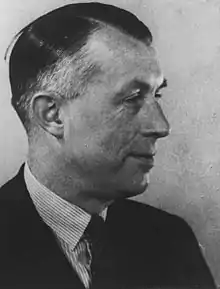Reginald Bassett
Reginald Bassett (1901 - 1962) was an English historian and Professor of Political Science at the London School of Economics.

He was educated at Ruskin College, Oxford and New College, Oxford. He was a lecturer under the Extra-Mural Studies Delegacy of the University of Oxford, lecturing mainly in Sussex. From 1945-50 he was a tutor at the London School of Economics for a course designed for students from trade unions. He was lecturer in political science from 1950–53, Reader in Political Science 1953-61 and Professor of Political Science 1961-62.[1]
Bassett was a member of the Independent Labour Party. In 1931 he supported Ramsay MacDonald's decision to a form the National Government with the Conservatives and the Liberals.[1] He later published a detailed history of the crisis of 1931, challenging the left-wing interpretation of it as a plot.
His famous 1948 article on Stanley Baldwin's "confession" of November 1936 challenged the view of Winston Churchill, who claimed in his history of the Second World War that Baldwin had admitted that an election fought on rearmament in 1935 would have been lost. Bassett proved that Baldwin was instead talking about 1933/34 when the public mood favoured disarmament, as revealed by the East Fulham by-election.[2]
Works
- The Essentials of Parliamentary Democracy (1935).
- Democracy and Foreign Policy (1952).
- Nineteen Thirty-one: Political Crisis (1958).
References
- BASSETT, Reginald, 1901-1962, Professor of Political Science, Jisc, retrieved 20 July 2018.
- Reginald Bassett, ‘Telling the truth to the people: the myth of the Baldwin "confession"’, Cambridge Journal, II (1948), pp. 84-95.